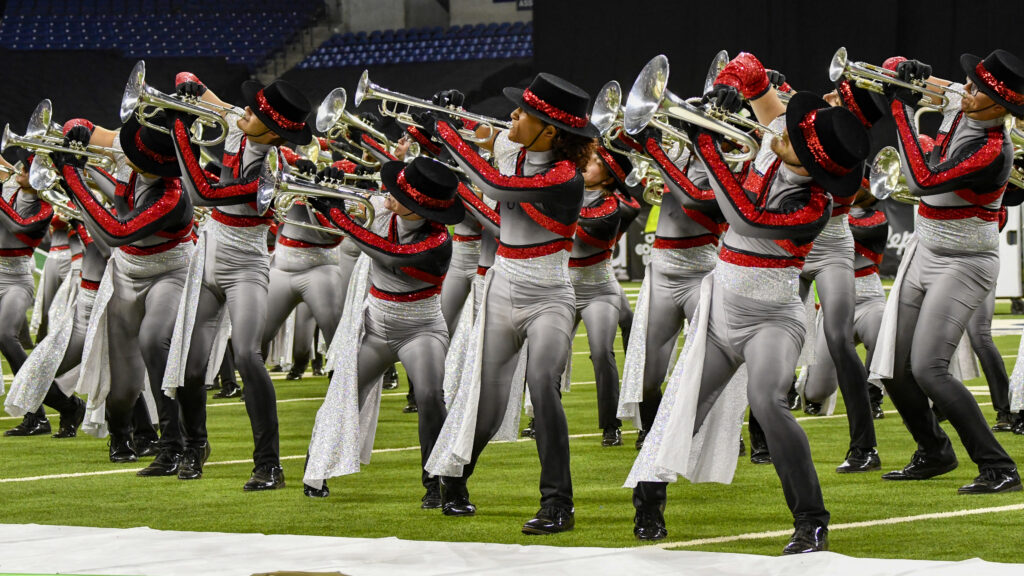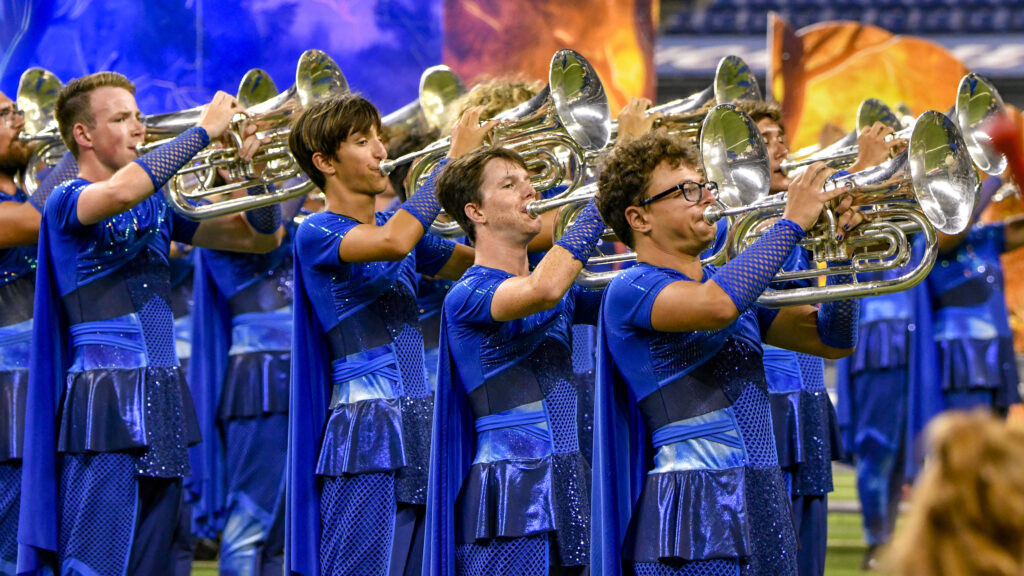After a weekend during which corps debated, learned and listened to presentations about amplification, Division I corps are split almost evenly on whether or not they plan to use it in 2004, with an equal percentage still undecided. An informal DCI.org poll conducted by phone and e-mail earlier this week found that six Division I corps plan to use amplification, nine do not plan to use it, and seven corps are undecided thus far.
Corps planning to use amplification:
Blue Knights
Boston Crusaders
Cadets
Colts
Magic of Orlando
Seattle Cascades
Corps not planning on using amplification:
Bluecoats
Capital Regiment
Glassmen
Kiwanis Kavaliers
Mandarins
Pioneer
Southwind
Spirit
Troopers
Corps undecided:
Blue Devils
Carolina Crown
Cavaliers
Crossmen
Madison Scouts
Phantom Regiment
Santa Clara Vanguard
The Blue Knights’ percussion ensemble demonstrated amplification of pit percussion instruments in a forum last Saturday in Denver, along with amplification specialists Mike Nevin and Ward Durrett. The Cavaliers’ director Jeff Fiedler said the forum was “excellent,” and added that a later discussion among corps staffs and industry experts was “excellent” as well.
“I wish we could have had all this information last year, with this kind of set up to the discussions and the demonstrations. I think peoples’ eyes were opened this weekend as to what the positives could be, as well as what the negatives could be with amplification,” Fiedler said.
Larry Markiewicz, director of the Crossmen, said, “The weekend opened up our minds. If we do use it, we want to do it right and do it well.”
“Corps were just trying to get information and understand all the issues this weekend,” said the Blue Devils’ Dave Gibbs of the weekend’s amplification emphasis. “A lot of people were trying to get the information.”
Gibbs, who moderated an amplification discussion this past Saturday, said that corps will be faced with three primary challenges if they choose to use amplification: Juggling the myriad of logistics a corps will undertake as a result of using amplification (power, microphones, speakers and mixing will all need to be addressed every night), using amplification well in the context of a corps’ show, and a corps’ giving amplification the proper research and development before employing it.
A DCI committee should have standards set for power supply and power accessibility within a month, according to Fiedler and Gibbs.
At your own risk
Corps planning on using amplification are proceeding at a “proceed at your own risk” pace. “I think nervous, cautious and wait-and-see are three good ways to characterize what we’re all about to experience this summer. We’re all hoping that everyone will exercise a great deal of caution and continue to remember that the goal of this rule is to provide sound reinforcement, not open Pandora’s box inside the box,” Fiedler said.
During discussions, corps directors pondered what might happen should a power outage strike a show area, or what would happen if a wireless amplification system began receiving signals from a source other than the corps on the field.
“Right now we can all imagine those “worst case” scenarios, both at performances and at rehearsals,” said the Phantom Regiment’s Pat Seidling. “Instead of fearing them, we are all beginning to accept that any and all “snafus” could happen, and that’s just part of showbiz. Just like accepting the chances for a blown drum head on the starting line, a wind-blown prop or a soloist with a stuck valve, we can’t live in fear of performance disasters! The idea of “go at your own risk” frees us from having to react to our fears, yet assures the activity that shows will go on and that the amped corps won’t get special treatment nor interrupt the flow of the event. The field remains level, so to speak, and the look and feel of our contests will remain as they are,” Seidling said.
Fiedler elaborated, “Each corps is expected to do their homework, work with experts and not wait until the last minute to figure out if and what they’re going to do and how they’re going to approach this — if they choose to amplify their pit sections or a voice. Since we don’t necessarily have “one acceptable way” to do this, there will be only a few commonalities from show to show. However, each corps understands that setups and necessary power might not be what they need and they’ll have to “punt” sometimes, or not use it at all.
“We’re also concerned about what each corps will need when they practice and the additional demand this could put on show sponsors for each corps they house. You can’t just bring 20 extension cords and think you’ll be able to plug in anywhere and that’s that. It is (as anyone with any kind of amplification experience can tell you) much, much more than that,” Fiedler said.
Yes or no?
David Glasgow, director of the Bluecoats, said his corps expects that they will most likely not use amplification. “We are probably not going to use it. We haven’t planned for it in the budget this year, and there’s nothing in our show that demands it. Maybe it will come up, but at this point we don’t expect it will,” Glasgow said.
On the other hand, Greg Orwoll of the Colts is planning on using amplification. “We’re going to play with, see if we can push the envelope a little bit,” Orwoll said.
Many other corps not using amplification cited financial reasons. “Money is the big issue,” said Southwind’s Mike Loeffelholz, a sentiment shared by Capital Regiment’s Rick Bays and Spirit’s Ken Bodiford.
Questions and answers
George Hopkins, director of the Cadets, said that he is planning to use amplification, yet is overwhelmed with questions about it. “I have personally never utilized the technology and thus, it is a bit frightening. How much do we spend, what do we purchase, what is the chance of the power going out? These are all valid questions amidst subject matter that can make one more than nervous,” Hopkins said. “We will use it, but in moderation. We will not use voice, we will not work for effects but rather, what we have in mind is simply the support of current percussive sounds that are more or less lost within the live performance.”
Fiedler said the Cavaliers’ design team remains undecided about the use of amplification. “We’ve discussed this and continue to discuss the subject every opportunity we get. We are considering using some reinforcement, specifically accessory percussion, especially this coming summer with some of the grooves, moods and atmospheres we’re trying to create with our 007 James Bond program.”
Hopkins said this season will prove to be the harbinger of things to come with regards to amplification in drum corps. “I think we will find good uses and not so good uses of amplification this summer, but within three years, the technology will be used with comfort and skill by all within the marching activity.”
Pat Seidling, director of the Phantom Regiment, said that his corps has not decided about using amplification or not, although the corps’ design team is fully versed in its usage. “In our case, both our primary music designers — Paul Rennick and J.D. Shaw — have an intimate knowledge of amplification, J.D. as a professional musician with Boston Brass and Paul through his deep involvement with “Blast!” and University of North Texas ensembles, so we are pretty versed in amplified performing. We move cautiously ahead not out of fear, but rather to ensure that when we do use amplification, it is an appropriate and positive addition to our production. I think many corps are in the same place as us in that regards.”
“On the lighter side, as of today, the only amps Phantom Regiment owns are two Long Rangers, and we can’t seem to keep those working! Needless to say, we have some procurement issues to deal with when we are in fact ready to amplify some of our pit instruments,” Seidling said.
Finally, Fiedler echoed many popular sentiments. “Some of the sounds I heard really opened my eyes in a positive way and some sounds, I believe, are better off not amplified,” Fiedler said.





